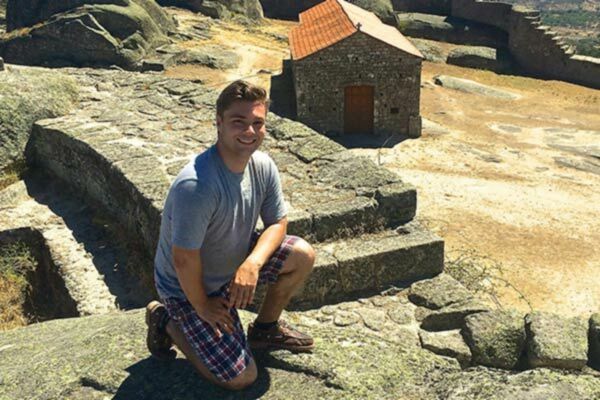
Ivan Carballude ('18), a double-major in History and Economics, is the last of our summer Student Spotlights. The fact that it took us until December to get through the best of our summer grant recipients is a wonderful testiment to our students! Ivan received the Pessoa Grant for Advanced Language Training in Portuguese for his language and cultural study in Lisbon. His time in Portugal certainly was rich--filled with classes, meals with friends and host family, and side trips. Ivan recently wrote to us about his experience:
My experience in Portugal over this past summer was about much more than advanced language training. From the moment I arrived in Portugal, I learned that the Portuguese are incredibly welcoming. I experienced this hospitality through the many wonderful people I met in Lisbon, both through the program I participated in, the Study in Portugal Network, and the host family SiPN connected me with, the Teixeiras. The experience I had with this family is one unique aspect of SiPN for which I am very grateful. The Teixeiras welcomed me into their home in Lisbon about one week after classes had started, and my host mother Maria made a delicious “arroz de pato”-duck rice- for dinner. One week later, I was invited to go with them to their beautiful summer home in Alentejo for the weekend. On Saturday night they had a group of friends over for a dinner party, which was the most fun and interesting night of my time in Portugal. We all enjoyed Portuguese Feijão (grilled meet with rice and black beans) - one of the most delicious meals I have ever had. After dinner, I was able to join in the Portuguese tradition of wild after-dinner conversation, and was surprised at how much I was able to contribute. Working with SiPN provided many benefits, including fantastic guidance and great trips (more on that later), but my experience with the Teixeiras is my fondest memory of Portugal.
Of course, a great deal of my time in Lisbon was spent in class. I enrolled in two classes: an intensive Portuguese class at the University of Lisbon, and a history of Portuguese literature course at ISCTE. The language course met for 20 hours a week, and 4 hours a day of instruction in Portuguese was extremely helpful in improving my conversational skills. It even gave me a bit of a continental Portuguese accent that I’m now proud to show off to my Brazilian friends. My teacher was great, and getting an opportunity to attend a prestigious European university and take part in its culture was amazing. I am very happy to have improved my Portuguese, but more than anything I am thankful for the friends I made in the class, and the cultures which they exposed me to. Our class included 17 students, among them three Americans, two Britons, two french students, two Russians (one of whom was VERY nationalistic), one Chinese student, and seven(!) students from Macau. Many of us became good friends, and a group of us grabbed lunch after class together virtually every day. I learned a lot about them and their cultures from our month together.
My second class was a history of Portuguese literature. This class met for only 6 hours a week, but included an additional 14 hours of out of class trips, including a trip to the historic Jerónimos Monastery, the house of Fernando Pessoa, and the workshop of Joana Vasconcelos, a famous Portuguese sculptor. My personal favorite trip was one in which we visited the José Saramago foundation and met the writer’s widow, Pilar. In class, where conversation varied between English and Portuguese, we covered Portuguese literature starting with medieval Galician-Portuguese poetry, continuing through to Camões, the Lusiads, and Portuguese romanticism, and finishing with Eça de Queirós, Pessoa, and Portuguese realism. More than anything, though, we learned about “saudade,” an aspect of Portuguese literature which transcends literary period. Saudade roughly translates as nostalgia, yet I was warned against translating on numerous occasions. According to the Portuguese, saudade is an emotion unique to their people and essential to their culture. Saudade is the manifestation of the nation’s history in the conscience of its people, a people who yearn for a return to their glory days, while dealing with their less than prestigious present position. This pride in their culture was apparent throughout my trip, from people’s enormous passion for their favorite soccer team (nowhere more obvious than at the 3 story Benfica team museum I was able to visit), to their various “bests in the world” including wine, food, and beaches.
In addition to these two amazing classes offered to us by SiPN, we were also treated to an amazing weekend trip in the Monsanto region, located close to the Spanish border in Portugal’s interior. On our way we stopped at Tomar, where we toured the Convento de Cristo, one of Portugal’s UNESCO world heritage sites. After Tomar, we arrived in Idanha-a-Nova, a small town from where our trip would be based. Over the next two days, we watched a traditional “Adufa” show, visited the Idanha watermelon festival, took a hike through a mountain fossil route, and finally visited the “most Portuguese town in Portugal”, Monsanto, and its pre-Moorish castle. It was a fantastic trip, and it allowed us to experience a remote part of Portugal with a culture distinctive from that of Lisbon.
Looking back on my experience, I am thankful for many things: the people I met, the fluency in Portuguese I gained, and the places I saw. I would recommend visiting Lisbon to anyone who wants to visit a beautiful European capital, rich in history, culture, and hospitality; and I would highly recommend SiPN for anyone who is thinking about studying there. Most of all, I am thankful to the Nanovic institute for the wonderful opportunity to study Portuguese, immerse myself in Portuguese culture, and have the most memorable summer of my life.